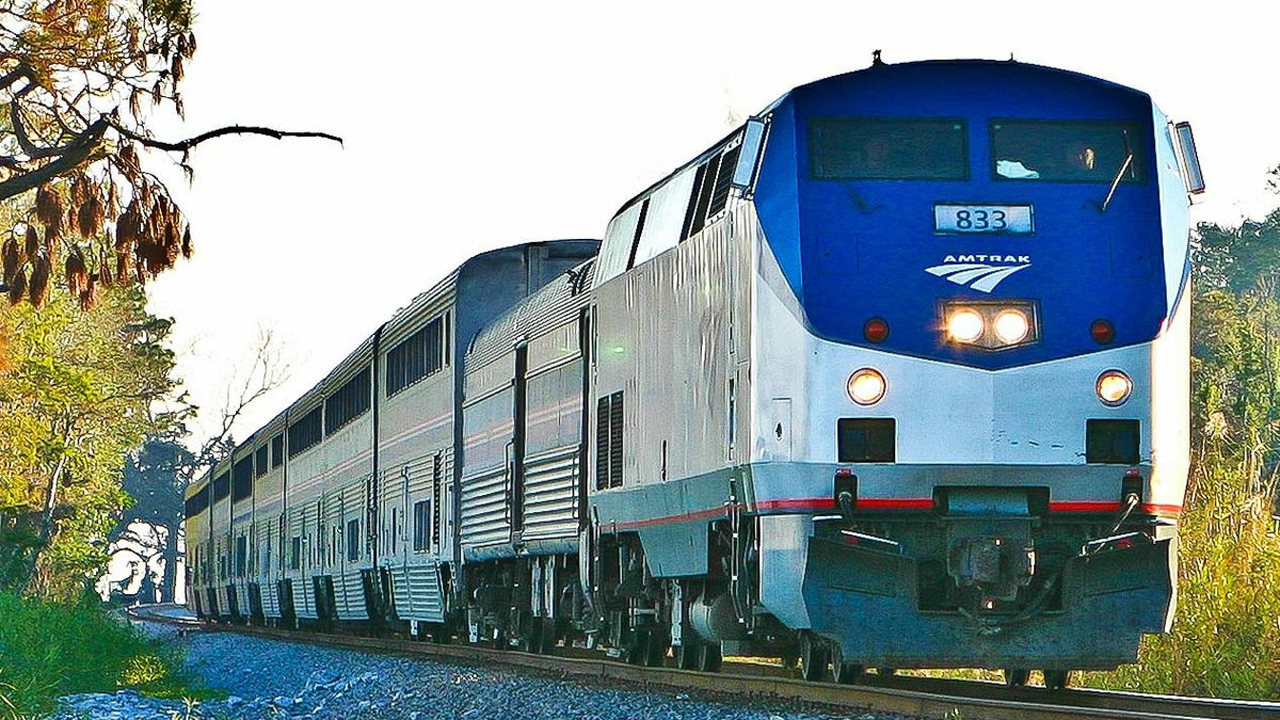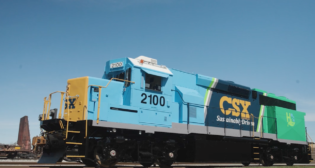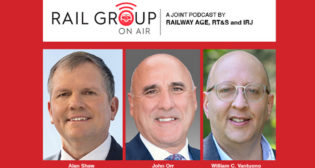
Amtrak Eyes STB Investigation Into ‘Substandard’ Sunset Limited Service
Written by Marybeth Luczak, Executive Editor
Amtrak in December called on the Surface Transportation Board (STB) to initiate an investigation into “substandard” customer on-time performance for Sunset Limited service between Louisiana and California. Host freight railroad Union Pacific (UP)—which Amtrak said will likely be the prime focus of the investigation—asked the STB on Jan. 27 to order mediation for Amtrak, UP and the other host railroads involved “to resolve or narrow the issues in dispute.”
The Sunset Limited is Amtrak’s long-distance intercity service that runs three times weekly between New Orleans and Los Angeles. It travels for most of that route over track that is hosted by UP, in addition to small portions of BNSF and CN trackage.
“Pursuant to Section 213 of the Passenger Rail Investment and Improvement Act of 2008,” Amtrak on Dec. 8, 2022 filed a complaint and petition to initiate an investigation by the STB into the performance of its Sunset Limited service, including Trains 1 and 2, and following that investigation, for STB to “undertake remedial proceedings to award Amtrak damages and other appropriate relief” (download filings below). Additionally, “America’s Railroad” proposed a framework for the STB to follow in this proceeding, and offered guidance on the information that should be collected and reviewed.
According to Amtrak’s filings, long-distance intercity passenger routes, such as the Sunset Limited, “continue to be plagued by substandard on-time performance that hurts Amtrak, its passengers, and the public interest. In Section 213, Congress established a mechanism for those harms to be investigated and remedied by the Board. This is the first complaint initiated by Amtrak since the Federal Railroad Administration (‘FRA’) promulgated the metrics and standards for measuring on-time performance in November 2020. Those measures confirm that the Sunset Limited performs well below the federal legal standard for on-time performance, and has done so for at least two consecutive quarters. Accordingly, Amtrak has filed a complaint and petition, and the Board must initiate an investigation to determine, first, the cause of delays and failure to achieve minimum standards on the Sunset Limited and, second, whether those delays result from the host railroads’ violations of Amtrak’s statutory right to preference over freight transportation.”
Amtrak reported that it “has extensive information readily at hand to aid in the Board’s investigation,” and will provide “documents and data that will enable the Board to examine all of the allegations in the complaint and petition, including the extent, cause, and persistence of substandard on-time performance and the related violations of Amtrak’s statutory right to preference.”
STB on Oct. 1, 2022 launched the Office of Passenger Rail to investigate the causes of substandard passenger rail on-time performance (OTP); to identify mitigating measures; and, under specified conditions, to prescribe relief.
Under PRIIA, FRA on Nov. 16, 2020, adopted a final rule establishing metrics and minimum standards for measuring the performance and service quality of Amtrak’s intercity passenger trains—following nearly 10 years of a contentious battle involving Amtrak and its host freight railroads that twice reached the U.S. Supreme Court.
According to STB, FRA, in conjunction with Amtrak, in late 2020 “promulgated a ‘Customer OTP’ metric to measure passenger rail OTP, which includes a standard that requires 80% of passenger arrivals at stations to occur within 15 minutes of the scheduled time.” This standard began to apply on July 1, 2021. PRIIA requires as a precondition for an STB OTP investigation that there be two consecutive quarters of substandard OTP.
Complaints may be brought by Amtrak, by an entity for which Amtrak operates intercity passenger rail service, by an intercity passenger rail operator, or by a host freight railroad over which Amtrak operates.
Amtrak in December 2022 reported that in every quarter since the standard became applicable, the westbound Sunset Limited, Amtrak Train 1 “has failed to meet the applicable standards by wide margins. Customer On-Time Performance (‘COTP’) was 40% in the first fiscal quarter of 2022. That figure was even lower in subsequent quarters, declining to 24% in the second fiscal quarter of 2022, 10% in the third fiscal quarter of 2022, and 11% in the fourth fiscal quarter of 2022.” Additionally, Amtrak said the eastbound Sunset Limited, Amtrak Train 2, “has demonstrated poor and deteriorating COTP. COTP for the Sunset Limited 2 was 40% in the first fiscal quarter of 2022. That figure declined to 35% in the second fiscal quarter of 2022, 11% in the third fiscal quarter of 2022, and 7% in the fourth fiscal quarter of 2022.”
Amtrak said the substandard on-time performance of these trains “is due largely to causes that can and should be addressed by UP.” These include the “extraordinary amount of freight train interference … that Sunset Limited trains encounter on lengthy segments of the Sunset Limited service hosted by UP; the use of enterprise-wide dispatching algorithms, policies, and/or practices that deny Sunset Limited Trains their statutory right to preference; and other UP operational practices that result in systemic violations of Amtrak’s rights,” according to Amtrak. The intercity passenger railroad said that “[a]s a result of these practices, and over the recently concluded fiscal year, UP imposed on the average Sunset Limited train more than 15 instances of FTI [freight train interference] per trip, resulting in more than 4 hours of delay for Amtrak passengers per trip.” According to Amtrak, “UP has routinely prioritized freight trains over Sunset Limited trains, including when resolving meets and passes, when determining access to main lines, and when otherwise failing to ensure that tracks are available for the scheduled and infrequent transit of Sunset Limited trains. Due in large part to these unlawful practices, the Sunset Limited is currently the worst-performing route for customers on Amtrak’s network.”
A Two-Phased Proceeding
Amtrak reported that at “the outset, Section 213 provides the Board with considerable discretion in shaping its investigation and awarding appropriate relief. Consistent with the structure of the statute, Amtrak recommends that the Board proceed in two distinct phases.” According to the intercity passenger railroad, the first phase of the proceeding should be investigative. “Congress charged the Board with developing a record and rendering its determination on ‘whether and to what extent delays or failure to achieve minimum standards’ on the Sunset Limited ‘are due to causes that could reasonably be addressed by’ host railroads, Amtrak, or other intercity passenger rail operators,” Amtrak reported. “The Board is also charged with determining whether delays or substandard on-time performance are attributable to a host railroad’s failure to provide preference to Amtrak. … Addressing these issues in a single investigative phase is appropriate and efficient; the determination of whether delays or sub-substandard on-time performance are attributable to preference violations is necessarily bound up in factual findings about the cause or causes of delay.”
Amtrak requested that the STB “commence the investigatory phase of proceedings by (i) authorizing Board staff to conduct preliminary fact-finding; (ii) directing the authorized staff members to request documents from Amtrak; (iii) directing the preservation of relevant host railroad records; (iv) directing the authorized staff members to request documents from host railroads; and (v) interviewing witnesses, making site visits, and gathering and evaluating any other relevant data; and entering an appropriate protective order to facilitate prompt production.”
According to Amtrak, the second phase of the proceeding should be remedial. “Under Section 213, the Board must ‘identify reasonable measures and make recommendations to improve the service, quality and on-time performance of the train,” Amtrak reported. “Should the Board determine that delays or substandard on-time performance are attributable to preference violations, it must also determine whether to award damages and other reasonable and appropriate relief.”
UP, BNSF and CN Respond
In separate January 2023 filings, UP, BNSF and CN weighed in on Amtrak’s request for an investigation into Sunset Limited service.
“The Board should order Amtrak, UP, and the other railroads involved in hosting Sunset Limited trains to engage in mediation to resolve or narrow the issues in dispute,” UP wrote in its filing (download below). “If mediation does not resolve this case, the Board should issue a procedural schedule based on the procedures it adopted in National Railroad Passenger Corporation—Section 213 Investigation of Substandard Performance on Rail Lines of Canadian National Railway Company, Docket No. NOR 42134 (STB served Jan. 3, 2012) (‘Canadian National’). The Board should not adopt Amtrak’s proposed procedures.”
According to UP, “Amtrak’s complaint and proposed procedures ignore the scheduling issue at the root of the Sunset Limited service’s on-time performance problems.” It pointed out that “Amtrak’s schedules for Train 1 and Train 2 are not aligned with the new customer on-time performance metric (‘COTP Metric’) or the customer on-time performance minimum standard (‘COTP Minimum Standard’) the Federal Railroad Administration (‘FRA’) adopted in its metrics and minimum standards rule (‘Final Rule’).” UP said “Amtrak’s own complaint reveals the scheduling disconnect. According to Amtrak’s data, in the first quarter of 2022, Train 1’s median run time was 31 minutes under the scheduled run time. The median run time over the route segment hosted by UP was 27 minutes under the scheduled run time. Yet, Train 1’s COTP was just 40%—far below the COTP Minimum Standard of 80%.”
In addition, UP reported, Amtrak’s procedural proposal “would restrict the Board’s role in developing recommendations to improve on-time performance, create inefficiency, and it violates due process.”
UP noted that Amtrak’s proposal would “divide this proceeding into separate phases: (i) investigating the causes of the Sunset Limited service’s failure to achieve minimum standards, and (ii) making recommendations to improve the on-time performance. Amtrak says each phase should include separate discovery processes and result in a separate finding and orders.” This is “not practical,” UP said. “The investigatory and remedial tasks Congress assigned to the Board are inextricably connected, as reflected in Congress’s express directions: ‘In making its determination [of the causes of failures to achieve minimum standards], the Board shall … make recommendations to improve … on-time performance of the train.’”
UP also said that under Amtrak’s proposal, the STB “could conclude that UP committed a preference violation without providing timely notice of the acts alleged to constitute the violation—that is, notice at a time when UP could meaningfully defend itself by offering evidence to rebut a specific charge.”
In BNSF’s filing (download below), it said it “enjoys a strong partnership with Amtrak and takes seriously its responsibilities for safely hosting Amtrak passenger rail trains, such as the Sunset Limited service, on its network.” BNSF reported that it deploys a “dedicated team at its Network Operation Center that collaborates 24/7 with Amtrak while it operates on BNSF-hosted rail lines.”
While Amtrak “repeatedly emphasized that BNSF hosts a small geographic portion of the Sunset Limited service and that ‘the Board’s investigation should likely focus on UP,” BNSF reported that it “stands ready to fully participate in this proceeding, as required by the Board or otherwise necessary to protect BNSF’s interests.”
The Class I pointed out, however, that “any such participation must provide sufficient due process to BNSF and any other subjects of the investigation requested by Amtrak. Amtrak has proposed charging the Board with developing the record in this case, conducting an investigation, and determining remedies—all apparently without the opportunity of the host railroads to present evidence and argument in defense. BNSF is concerned that this approach would deprive the host railroads of due process with respect to any determinations related to preference and damages that the Board may make in this proceeding.”
CN in its filing (download below) wrote that “Amtrak has proposed a procedural framework that is inconsistent with and ignores the Board’s prior determination that a proceeding under 49 U.S.C. § 24308(f) (‘Section 213’) ‘should be adjudicated using the established procedures governing complaints and the encompassing discovery and motion practice guidelines set forth in Parts 1112 and 1114 of our rules,’ and that it is appropriate ‘to have the record built through party-directed discovery.’” According to CN, “use of the Board’s ‘established procedures’ will assure that a robust and complete record is created, and that the due process rights of the parties are safeguarded.” Amtrak’s proposed alternative, however, “calls for the Board to ‘develop’ the record and make ‘determinations’ without any clear delineation of the parties’ rights and due process protections.”
Additionally, CN wrote that it “need not and should not be a focus of this proceeding” because Amtrak “has no agreement with CN for the Sunset Limited service and pays CN nothing for the service. Thus, under FRA’s definition of ‘host railroad,’ CN is not a host for the Sunset Limited service. … CN has only the most tenuous connection to the Sunset Limited service—Amtrak’s two trains in that service operate via Union Pacific … trackage rights over 2.2 miles of track owned by CN and leased to a short line since 2019.” Lastly, CN wrote, Amtrak’s complaint does not include “specific allegations directed at CN, and CN is unaware of Amtrak ever raising any concerns with CN about the Sunset Limited service.”
Next move: STB’s.



